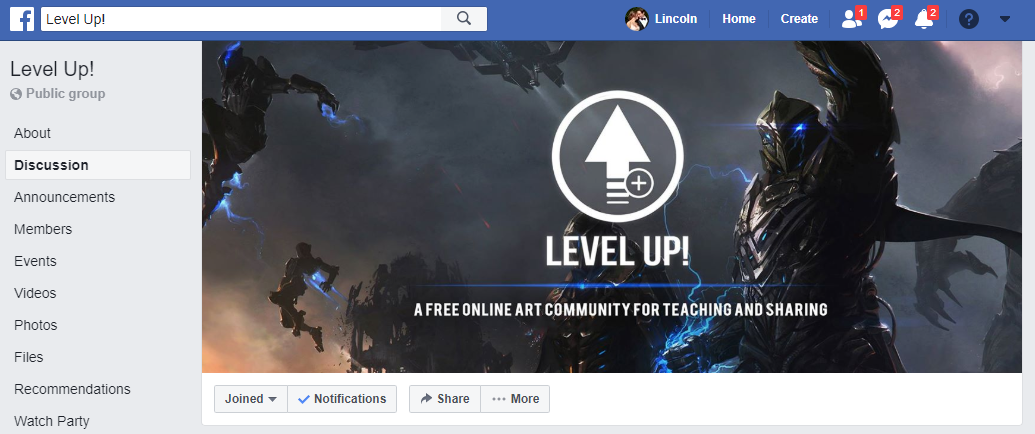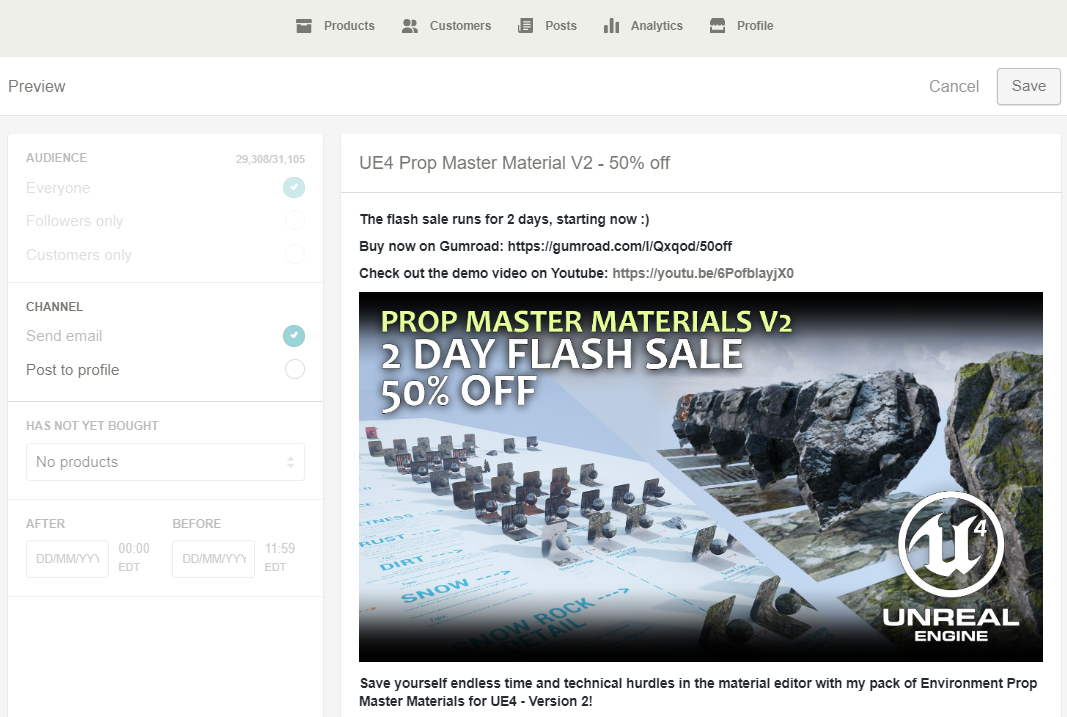The Beginner’s Guide to Selling Game Art Assets Online - Part 1
Lincoln Hughes is a household name in the gaming industry and has created a Gumroad empire through a variety of different methods. In this article, we’ll look at some of the best ways to begin selling game art assets online, how free content can benefit your image and provide value as well as an eye opening explanation that this can be your career.
My name is Lincoln Hughes and I’m an Assistant Art Director at Tuque Games in Montreal (Owned by Wizards of the Coast). I’ve worked for a bunch of different companies throughout my career including Ubisoft, WB Games, Electronic Arts, and Relic THQ.
Over the past couple of years I’ve been giving away / selling game-art related tools online and I’m here to give you all some info on my experience regarding the creation of my online business. If you’ve been thinking of dipping your toe in selling 3d asset packs on the Unreal Marketplace, Artstation, or on Gumroad, I’m hoping that this article will really help you out.
Also, if you’d like to download a bunch of free Game-Art Related Tools for Unreal 4, Free Photo-Packs, or even buy one of my products, you can find them on my Gumroad page here. By inputting the code ‘exppoints’ in at the checkout window, you’ll also receive 30% off of the paid products for the month of June.
Have a business plan that doesn’t revolve around making money
My business plan consisted of creating a ton of content (i.e. shaders, photo-packs, tutorials, etc), giving it away for free, and establishing a relationship with my customers where to the best of my abilities, I help them as much as possible. I barely made a cent for the first year that I did this. I wasn’t doing it for the money (although it wouldn’t hurt if I did make some), I was doing it for a multitude of other reasons, like these:
-Helping people become better artists
-Alleviating technical difficulties for anybody using Unreal Engine 4
-Establishing a name for myself in the games industry
-Getting experience creating tutorials
-Getting experience with public speaking
-Demonstrating to future studios I might work at, that I know what I’m doing
-Building an audience for a future where I do start selling products
Creating tutorials online isn’t just a way of selling stuff. It’s a way of establishing your name and reputation in an industry filled with an overflowing pool of incredibly talented people. It’s one of the best ways that you can demonstrate to companies that you know what you’re talking about.
Think of a tutorial video as a portfolio piece. If you help a ton of people in the industry solve a specific technical problem, now whenever your name gets mentioned as a potential candidate for a job, you’re the guy that knows his stuff. You’re the guy that wants to teach people how to learn new techniques and become better artists. Not a bad thing for somebody looking for a job eh?
If I’m looking to hire somebody and I have two candidates in front of me, one that has a decent portfolio, the other also has that plus a ton of videos online showing people techniques in the exact specialisation that I’m looking to hire them for, who do you think I’m going to hire?
What is your plan for reaching the maximum number of people online?
Facebook ads, YouTube ads, Instagram ads, organic traffic on every platform… It’s so overwhelming to think about all of this. Why can’t we just put it on Artstation or Gumroad and be done with it?
In my experience, if your goal is to make sales, you either need to firmly establish an online audience before launching a paid product, or have an absolutely knockout product that will sell itself purely based on word of mouth (i.e. organic online traffic), or spend a ton of money on ads to get the word out. Or all three combined.
Simply throwing a random product on the Unreal Marketplace most likely won’t result in the creation of a solid revenue stream for you. Showing entire audiences that you’re there to help them solve their problems will. How can you do that?
There are a ton of different outlets for solving problems for people online - The Unreal Engine 4 developers community, Level-Up, Ten-Thousand Hours, and Polycount Forums, just to name a few. By firmly establishing yourself as a helper in online forums, your reputation becomes synonymous with value, not just in that forum but potentially with the leads and directors at the company that you’re looking for a job at.
Facebook Level Up! Group Forum
In my experience, one of the quickest ways to increase your audience size is by giving away free stuff.
The way that Gumroad works is that every time you buy a product from somebody, the owner of the content gets your email address in a big list. That list can then be used by them to send various emails and ads to their previous customers about new products, or basically anything that the owner of the list wants (i.e. affiliate products, sales, free content, new art they released, etc).
People hate ads. I absolutely hate combing through 30 junk mails just to find that one gem that gives me value. If you’re going to go this route (creating an email list with free content on Gumroad), don’t spam people with useless shit that they won’t care about. That’s part of the reason why I hold firm to the belief that you need to establish a relationship with your customers that revolves around giving them value: When you do send an email out that will actually help them in some way, they’ll open it instead of sending it directly to the trash or blocking it. Some of them will comment on it, some will re-share it, and every time this happens, it’ll help to boost organic traffic in whatever platform you’re using to sell your product - which will in turn help to drive sales, or perpetuate the wheel of people viewing your content.
A Gumroad Ad example for my UE4 Prop Master Materials - Version 2
Also, if you do go this route, by the time you’ve actually released a paid product, people will want to help you by buying your stuff. They’ll be happy to support somebody that supported them.
What do you like to create?
A big part of actually maintaining the motivation to do all of this stuff will revolve around doing something that you actually enjoy and have a passion for. You’ll need to ask yourself questions like: What do I like to learn? What is my favourite thing to create? If your product isn’t a byproduct of the answers to these questions, you’ll likely run out of steam before reaching the finish line.
Creating a product for people that helps them, and is fun to make will create a circle of perpetual motion that will continue to grow. By deeply analysing your motivations for doing this, you’ll also start to realise what your strengths and weaknesses are concerning your creation process, and what you’ll need to do to evolve and fit them into your business plan.
If you’re lacking the motivation to actually start creating content, stop beating yourself up. Self-deprecation is one of the biggest demotivators on the planet. Take deep breaths and repeat after me. You are amazing. You’re talented. Anybody that ever amounted to anything was right where you are right now. Anything that you need to learn, you can. Any bit of information that you need, is (for the first time ever with the internet) at the tips of your fingers. I love you. Wait, what???
All kidding aside, if that mantra doesn’t work (including the bit about me loving you…), force yourself to start anyway. As soon as you start doing something that you actually enjoy, even if you don’t feel like it, you’ll soon end up feeling like doing it anyways. You might not feel like painting, until you start to actually see an amazing piece actually forming on the canvas in front of you. By then you’re not even thinking about needing the motivation to continue to paint, you’re actually just enjoying working on it. Going to the gym sucks until you start to feel great, and that six-pack replaces the one that was sitting on your kitchen counter.
Amazing Content is Key
We all know this. Having good content is number one when it comes to this stuff, but what they don’t tell you is that depending on your audience, your content needs to be generalised to be able to help the maximum number of people possible (if you want to maximise your sales). If I were to create content for the Unreal Marketplace, creating a medieval potion pack probably wouldn’t actually help that many people, as it will only cater to the people that need potion models for a medieval game. The idea isn’t generalised enough.
Figuring out what type of product you should make will involve some questions. What are most people buying in your chosen marketplace? How can you create content for that specific corner of the market in such a way that hasn’t been done before? How can you generalise your content ideas so that the maximum number of people will be helped by your product?
The Unreal Marketplace
For the medieval potion asset pack example above, instead of making it medieval, could we change the look of the potions so that they could be used in multiple settings instead of just the medieval genre? Perhaps by changing the style of the bottle, or making another type of bottle mesh instead of just the medieval one, so that it could be used in a modern, scientific setting as well. Maybe our meshes span multiple timelines, i.e. Ancient, Medieval, Modern, Future. You already have the materials and pipeline down for creating beakers, so use it to take the idea further and maximise your target audience in such a way that you won’t create endless work for yourself. Be less specific when choosing what you will make as a product.
Also, if a competitor with a similar product exists on the market, you’ll need to ask yourself how you can make your product stick out from the competition. Does it look better? Is it easier to use? Is it cheaper in terms of performance? Does it cost less or more? How does it help the customer more than theirs? If your product doesn’t check any of these boxes, you might have a problem.
Conclusion
In the next article, I’ll be talking about Pricing your Products, Choosing a Platform to Sell on, Collaborating with other sellers, and giving some general marketing tips for people that are just starting to sell their products online.
Really hoped that you guys liked it! Also, if the article really struck a chord with you, don’t forget to like / comment / share it, and if you’d like to subscribe to my various channels, here are some links that might help you (and me) out.








